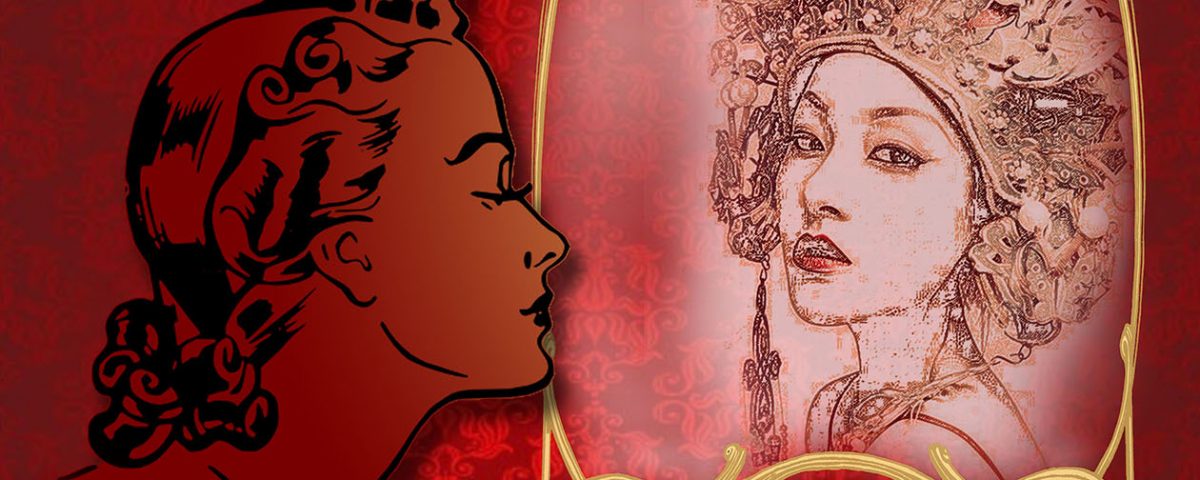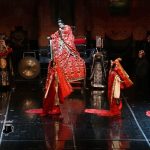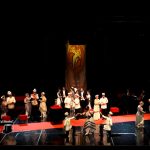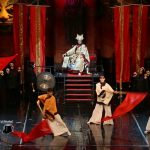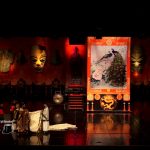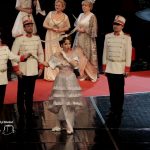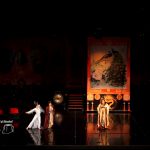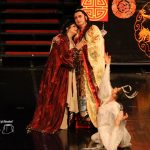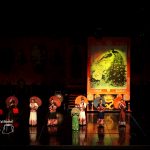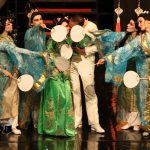“The Land of Smiles”, a romantic operetta in 3 acts by Franz Lehár, after a libretto by Ludwig Herzer and Fritz Löhner-Beda, is an impossible love story between two worlds. A bittersweet story crushed by the cultural differences between European education and Chinese tradition.
As ambassador to Vienna, Prince Sou-Chong meets Lisa, the daughter of Field Marshal Ferdinand Lichtenfels. Feeling strongly attracted to the young woman’s beauty, Sou-Chong makes Lisa a discreetly courting. Lisa, fascinated by the oriental world, the mystery he has hides the prince’s permanent and kind smile, embarks on a great adventure, following Sou-Chong to China.
Cast
Conductor – Lucian Vlădescu
Cast:
Sou Chong – Alfredo Pascu
Lisa – Patricia Seymour
Gustav von Pottenstein – Anton Zidaru
Sikkima – Gabriela Daha
Luan Bird – Cristina Osiceanu
The Eunuch – Oana Rusu
Thondup – Orest Pîslariu-Ranghilof
Field Marshal Leonard Lichtenfels – Cristian Caraman
The General – George Matei
The High Priest – Arnold Mack
The valet – Marius Meragiu
Tachi – Bogdan Ardeleanu
Four admirers: Carmen Angheloiu, Ileana Lenghel, Ana Maria Racu, Aurelia Tudor
Sou-Chong (After 30 years) – Cătălin Cocheș
Lisa (after 30 years) – Eugenia Ilinca
Sou-Chong’s son – Ștefan Băloi
Conductor – Alexandru Ilie
Cast:
Sou Chong – Alfredo Pascu
Lisa – Patricia Seymour
Gustav von Pottenstein – Andrei Pleșca
Sikkima – Gabriela Daha
Luan Bird – Cristina Osiceanu
The Eunuch – Letiția Vlădescu
Thondup – Orest Pîslariu-Ranghilof
Field Marshal Leonard Lichtenfels – Cristian Caraman
The General – George Matei
The High Priest – Arnold Mack
The valet – Marius Meragiu
Tachi – Bogdan Ardeleanu
Four admirers: Carmen Angheloiu, Ileana Lenghel, Ana Maria Racu, Aurelia Tudor
Sou-Chong (After 30 years) – Cătălin Cocheș
Lisa (after 30 years) – Eugenia Ilinca
Sou-Chong’s son – Ștefan Băloi
Conductor – Alexandru Ilie
Cast:
Sou Chong – Alfredo Pascu
Lisa – Doina Scripcaru
Gustav von Pottenstein – Andrei Pleșca
Sikkima – Gabriela Daha
Luan Bird – Cristina Osiceanu
The Eunuch – Oana Rusu
Thondup – Orest Pîslariu-Ranghilof
Field Marshal Leonard Lichtenfels – Cristian Caraman
The General – George Matei
The High Priest – Arnold Mack
The valet – Marius Meragiu
Tachi – Bogdan Ardeleanu
Four admirers: Carmen Angheloiu, Ileana Lenghel, Ana Maria Racu, Aurelia Tudor
Sou-Chong (After 30 years) – Cătălin Cocheș
Lisa (after 30 years) – Eugenia Ilinca
Sou-Chong’s son – Ștefan Băloi
Conductor – Alexandru Ilie
Cast:
Sou Chong – Alfredo Pascu
Lisa – Doina Scripcaru
Gustav von Pottenstein – Andrei Pleșca
Sikkima – Gabriela Daha
Luan Bird – Cristina Osiceanu
The Eunuch – Oana Rusu
Thondup – Orest Pîslariu-Ranghilof
Field Marshal Leonard Lichtenfels – Cristian Caraman
The General – George Matei
The High Priest – Arnold Mack
The valet – Marius Meragiu
Tachi – Bogdan Ardeleanu
Four admirers: Carmen Angheloiu, Ileana Lenghel, Ana Maria Racu, Aurelia Tudor
Sou-Chong (After 30 years) – Cătălin Cocheș
Lisa (after 30 years) – Eugenia Ilinca
Sou-Chong’s son – Marian Chirazi
Conductor – Giovanni Pompeo
Director – Anda Tăbăcaru
Sou Chong – Alfredo Pascu
Lisa – Doina Scripcaru
Gustav von Pottenstein – Andrei Pleșca
Sikkima – Gabriela Daha
Luan Bird – Cristina Osiceanu
The Eunuch – Oana Rusu
Thondup – Orest Pîslariu-Ranghilof
Field Marshal Leonard Lichtenfels – Cristian Caraman
The General – George Matei
The High Priest – Arnold Mack
The valet – Marius Meragiu
Tachi – Bogdan Ardeleanu
Four admirers: Carmen Angheloiu, Ileana Lenghel, Ana Maria Racu, Aurelia Tudor
Sou-Chong (After 30 years) – Cătălin Cocheș
Lisa (after 30 years) – Eugenia Ilinca
Sou-Chong’s son – Marian Chirazi
Conductor – Aleandru Ilie (Debut)
Sou Chong – Alfredo Pascu
Lisa – Patricia Seymour
Gustav von Pottenstein – Andrei Pleșca
Sikkima – Mediana Vlad
Luan Bird – Cristina Osiceanu
The Eunuch – Letiția Vlădescu
Thondup – Orest Pîslariu-Ranghilof
Feld Marshal Leonard Lichtenfels – Cristian Caraman
General – George Matei
The High Priest – Arnold Mack
The valet – Marius Meragiu
Tachi – Bogdan Ardeleanu
Four admirers:Carmen Angheloiu, Ileana Lenghel, Ana Maria Racu, Aurelia Tudor
Sou-Chong (after 30 years) – Cătălin Cocheș
Lisa (after 30 years) – Eugenia Ilinca
Sou-Chong’s son – Marian Chirazi
Conductor – Lucian Vlădescu
Sou Chong – Alfredo Pascu
Lisa – Doina Scripcaru
Gustav von Pottenstein – Anton Zidaru
Sikkima – Gabriela Daha
Luan Bird – Cristina Osiceanu
The Eunuch – Oana Rusu
Thondup – Orest Pîslariu-Ranghilof
Feld Marshal Leonard Lichtenfels – Cristian Caraman
General – George Matei
The High Priest– Arnold Mack
The valet – Marius Meragiu
Tachi – Bogdan Ardeleanu
Four admirers: Carmen Angheloiu, Ileana Lenghel, Corina Plopeanu, Aurelia Tudor
Sou-Chong (after 30 years) – Cătălin Cocheș
Lisa (after 30 years) – Eugenia Ilinca
Sou-Chong’s son – Marian Chirazi
Ballet:
The Bird: Cristina Osiceanu,
Soloists: Monica Ștraț, Eugenia Stoian,
Back Up: Iolanda Petrescu
Girl Ensemble: Oana Vâlceanu, Sabina Ioniță, Raisa Radamovschi, Camelia Ghiță, Gabriela Pojoreanu, Andreea Bârzescu, Alexandra Boriia, Denisa Atanasiu
Back up: Raluca Herciu
Boys Ensemble: Marian Chirazi, Relu Dobrin, Lorendi Rădulescu, Andrei Ciobanu, Octavian Ștefănescu
Sou-Chong– Alfredo Pascu
Lisa – Doina Scripcaru
Gustav von Pottenstein – Anton Zidaru
Sikkima – Mediana Vlad
Luan Bird – Cristina Osiceanu
The Eunuch – Letiția Vlădescu
Thondup – Orest Pîslariu Ranghilof
Field Marshal Ferdinand Lichtenfels – Cristian Caraman
General – George Matei
The High Priest – Arnold Mack
The valet – Marius Meragiu
Tachi – Bogdan Ardeleanu
Four admirers: Carmen Angheloiu, Ileana Lenghel, Corina Plopeanu, Aurelia Tudor
Sou-Chong (after 30 years) – Cătălin Cocheș
Lisa (after 30 years) – Eugenia Ilinca
Sou-Chong’s son – Marian Chirazi
Ballet:
Cristina Osiceanu, Monica Ștraț, Eugenia Stoian, Andreea Toma, Oana Vâlceanu, Diana Marin, Dana Moise, Geraldina Petre, Camelia Ghiță, Gabriela Pojoreanu, Armina Khachatryan, Ștefan Băloi, Relu Dobrin, Lorendi Rădulescu, Andrei Ciobanu, Raul Oprea
Stage orchestra: Mihai Predescu (vioară), Gabriel Joițoiu (violoncel), Alexandru Burcă (pian), Georgeta Radu (percuție)
Special figuration: Papa Dumitru, Iacob Petre, Branderburg Ștefan, Emil Popescu
Sou-Chong– Alfredo Pascu
Lisa – Patricia Seymour
Gustav von Pottenstein – Anton Zidaru
Sikkima – Gabriela Daha
Luan Bird – Cristina Osiceanu
The Eunuch – Oana Rusu
Thondup – Orest Pîslariu Ranghilof
Field Marshal Ferdinand Lichtenfels – Cristian Caraman
General – George Matei
The High Priest – Arnold Mack
The valet – Marius Meragiu
Tachi – Bogdan Ardeleanu
Four admirers: Carmen Angheloiu, Ileana Lenghel, Corina Plopeanu, Aurelia Tudor
Sou-Chong (after 30 years) – Cătălin Cocheș
Lisa (after 30 years) – Eugenia Ilinca
Sou-Chong’s son – Marian Chirazi
Ballet:
Monica Strat, Eugenia Stoian, Oana Vâlceanu, Diana Marin, Dana Moise, Geraldina Petre, Raisa Radamovschi, Camelia Ghiță, Gabriela Pojoreanu, Sabina Ioniță, Cristina Osiceanu, Marian Chirazi, Relu Dobrin, Lorendi Rădulescu, Andrei Ciobanu, Octavian Ștefănescu
Stage Orchestra: Mihai Predescu (vioară), Gabriel Joițoiu (violoncel), Adina Cocargeanu (pian), Imola Tamaș (percuție)
Special figuration: Papa Dumitru, Iacob Petre, Branderburg Ștefan, Emil Popescu
Sou-Chong– Daniel Madia
Lisa – Patricia Seymour
Gustav von Pottenstein – Andrei Pleșca
Sikkima – Mediana Vlad
Luan Bird – Cristina Osiceanu
The Eunuch – Letiția Vlădescu
Thondup – Orest Pîslariu Ranghilof
Field Marshal Ferdinand Lichtenfels – Mihnea Lamatic
General – Cristian Caraman
The High Priest– Arnold Mack
The valet – Marius Meragiu
Tachi – Bogdan Ardeleanu
Four admirers: Carmen Angheloiu, Ileana Lenghel, Corina Plopeanu, Aurelia Tudor
Sou-Chong (after 30 years) – Cătălin Cocheș
Lisa (after 30 years) – Eugenia Ilinca
Sou-Chong’s son – Marian Chirazi
Ballet: Monica Strat, Eugenia Stoian, Oana Vâlceanu, Diana Marin, Dana Moise, Geraldina Petre, Raisa Radamovschi, Camelia Ghiță, Gabriela Pojoreanu, Sabina Ioniță, Cristina Osiceanu, Ștefan Băloi, Relu Dobrin, Lorendi Rădulescu, Andrei Ciobanu
Back Up: Astrid Tomescu, Denisa Anastasiu, Octavian Ștefănescu
Stage Orchestra: Mihai Predescu (vioară), Gabriel Joițoiu (violoncel), Adina Cocargeanu (pian), Imola Tamaș (percuție)
Special figuration: Papa Dumitru, Iacob Petre, Branderburg Ștefan, Emil Popescu
Sou-Chong– Alfredo Pascu
Lisa – Doina Scripcaru
Gustav von Pottenstein – Anton Zidaru
Sikkima – Gabriela Daha
Luan Bird – Cristina Osiceanu
The Eunuch – Oana Rusu
Thondup – Orest Pîslariu Ranghilof
Field MarshalFerdinand Lichtenfels – Mihnea Lamatic
General – Cristian Caraman
The High Priest – Arnold Mack
The valet – Marius Meragiu
Tachi – Bogdan Ardeleanu
Four admirers: Carmen Angheloiu, Ileana Lenghel, Corina Plopeanu, Aurelia Tudor
Sou-Chong (after 30 years) – Cătălin Cocheș
Lisa (after 30 years) – Eugenia Ilinca
Sou-Chong’s son – Marian Chirazi
Ballet soloist: Andreea Toma, Eugenia Stoian, Marian Chirazi
Stage orchestra: Mihai Predescu (vioară), Gabriel Joițoiu (violoncel), Adina Cocargeanu (pian), Imola Tamaș (percuție)
Special figuration: Papa Dumitru, Iacob Petre, Branderburg Ștefan, Emil Popescu
Sou-Chong– Daniel Madia
Lisa – Patricia Seymour
Gustav von Pottenstein – Andrei Pleșca
Sikkima – Mediana Vlad
Luan Bird – Cristina Osiceanu
The Eunuch – Letiția Vlădescu (debut)
Thondup – Orest Pîslariu-Ranghilof
Field Marshal Ferdinand Lichtenfels – Mihnea Lamatic
General – Cristian Caraman
The High Priest– Arnold Mack
The valet – Marius Meragiu
Tachi – Bogdan Ardeleanu
Four admirers: Carmen Angheloiu, Ileana Lenghel, Corina Plopeanu, Aurelia Tudor
Sou-Chong (after 30 years) – Cătălin Cocheș
Lisa (after 30 years) – Eugenia Ilinca
Sou-Chong’s son – Marian Chirazi
Ballet solists: Eugenia Stoian, Monica Strat, Diana Marin, Raluca Herciu, Geraldina Petre, Raisa Radamovschi, Dana Moise, Mihaela Ștefănescu, Oana Vâlceanu, Camelia Ghiță, Gabriela Pojoreanu, Marian Chirazi, Andrei Ciobanu, Relu Dobrin, Lorendi Radulescu, Octavian Ștefănescu
Stage orchestra: Mihai Predescu (vioară), Gabriel Joițoiu (violoncel), Adina Cocargeanu (pian), Imola Tamaș (percuție)
Special figuration: Papa Dumitru, Iacob Petre, Branderburg Ștefan, Emil Popescu
Sou-Chong– Alfredo Pascu
Lisa – Doina Scripcaru
Gustav von Pottenstein – Anton Zidaru
Sikkima – Gabriela Daha
Luan Bird – Cristina Osiceanu
The Eunuch – Oana Rusu
Thondup – Orest Pîslariu-Ranghilof
Field Marshal Ferdinand Lichtenfels – Mihnea Lamatic
General – Cristian Caraman
The High Priest– Arnold Mack
The valet – Marius Meragiu
Tachi – Bogdan Ardeleanu
Four admirers: Carmen Angheloiu, Ileana Lenghel, Corina Plopeanu, Aurelia Tudor
Sou-Chong (after 30 years) – Cătălin Cocheș
Lisa (after 30 years) – Eugenia Ilinca
Sou-Chongțs son – Marian Chirazi
Ballet soloists: Andreea Toma, Eugenia Stoian, Marian Chirazi
Stage orchestra: Mihai Predescu (vioară), Gabriel Joițoiu (violoncel), Adina Cocargeanu (pian), Imola Tamaș (percuție)
Special figuration: Papa Dumitru, Iacob Petre, Branderburg Ștefan, Emil Popescu
Sou-Chong– Daniel Madia
Lisa – Patricia Seymour
Gustav von Pottenstein – Andrei Pleșca
Sikkima – Mediana Vlad
Luan Bird – Cristina Osiceanu
The Eunuch – Oana Rusu
Thondup – Orest Pîslariu-Ranghilof
Field Marshal Ferdinand Lichtenfels – Mihnea Lamatic
General – Cristian Caraman
The High Priest – Arnold Mack
The valet – Marius Meragiu
Tachi – Bogdan Ardeleanu
Four admirers: Ileana Lenghel, Carmen Angheloiu, Ana Maria Racu, Jeaninne Bradler
Sou-Chong (after 30 years) – Cătălin Cocheș
Lisa (after 30 years) – Eugenia Ilinca
Sou-Chong’s son – Marian Chirazi
Ballet soloists: Andreea Toma, Eugenia Stoian, Stefan Baloi
Starge orchestra: Mihai Predescu (vioară), Gabriel Joițoiu (violoncel), Adina Cocargeanu (pian), Imola Tamaș (percuție), Dan Ivanciu (percuție).
Special figuration: Papa Dumitru, Iacob Petre, Eduard Vișan, Pavel Alexandru
Sou-Chong– Alfredo Pascu
Lisa – Doina Scripcaru
Gustav von Pottenstein – Andrei Pleșca
Sikkima – Gabriela Daha
Luan Bird – Cristina Osiceanu
The Eunuch – Oana Rusu
Thondup – Orest Pîslariu-Ranghilof
Field Marshal Ferdinand Lichtenfels – Mihnea Lamatic
General – Cristian Caraman
The High Priest – Arnold Mack
The valet – Marius Meragiu
Tachi – Bogdan Ardeleanu
Four admirers: Carmen Anghel, Carmen Angheloiu, Ana Maria Racu, Jeaninne Bradler
Sou-Chong (after 30 years) – Cătălin Cocheș
Lisa (after 30 years) – Eugenia Ilinca
Sou-Chong’s son – Marian Chirazi
Ballet soloists: Andreea Toma, Eugenia Stoian, Marian Chirazi
Stage orchestra: Mihai Predescu (vioară), Gabriel Joițoiu (violoncel), Adina Cocargeanu (pian), Imola Tamaș (percuție), Dan Ivanciu (percuție).
Special figuration: Papa Dumitru, Iacob Petre, Eduard Vișan, Pavel Alexandru
Creative Team:
Artistic director: Anda Tăbăcaru
Artistic assistance: Cătălin Voineag
Scenography and lighting design: PhD architect Cătălin Ionescu-Arbore
Choreography: Mălina Andrei
Choreography assistant: Andreea Toma
Chorus Conductor: Aurel Muraru
Musical training: Gőnul Aptula, Adina Cocargeanu, Crinela Barbu, Andreea Dobia, Alexandru Burca
Martial arts instructor: Cristian Manciu
Concept video projections: Anca Albani
Technical Team:
Technical coordinator: Emil Popescu
Lights: Nicolae Stancu
Sound: Dragoș Vișan
Stage director: Roxana Tudor and Sorin Ciucă
Backstage director: Cătălin Cocheș
Delegated producer: Corina Ștefan
Purchasing service: Laura Dumitrașcu
Makeup-hairdressing coordinator: Georgeta Ivan Dumitru
If I were to invent a subtitle for Franz Lehar’s Operetta “The Land of Smiles”, it would be “The Tale of an Illusion”. The love of the European Lisa for the Chinese prince Sou-Chong is a beautiful illusion that every woman has the right to dream of. Today, the barrier of distance, of conceptions about the world and life, almost only exists in the corners of the world where we talk about extremism. In the last century, the barrier existed. Therefore, a love story between an emancipated European like Lisa and a Chinese subject to the rigors of office but, especially, of the millennial tradition like Prince Sou-Chong, cannot have a happy ending. I am convinced that Lisa has been attracted since childhood to the fascination of the Far East in the stories of the 1001 nights. Growing up, this fascination intensified. She met the “prince in the story” and thought she had met the ideal happiness. When she left for his world, she realized that she saw the harsh reality of differences in mentality, education, habits, living the most terrible disappointment.
Symbolically, I wanted to materialize Lisa’s sensitivity and soul by embodying the fascinating Luan bird in Chinese mythology. It takes over, during the events, the Lisa’s successes states of happiness, sadness, turmoil and disappointment. In contrast to the grace of this bird, there is the rigidity of the MASK in the “Land of Smiles”. As Prince Sou-Chong himself says, “he hides the feelings under the mask of the smile”. The mask increases, becoming far too overwhelming for Lisa. The millennial mask does not know and does not accept tolerance. Lisa’s soul does not accept compromise. Hence the sad, inevitable end.
Together with the conductor Lucian Vlădescu, the scenographer Cătălin Ionescu Arbore and the choreographer Mălina Andrei, I imagined a show in which a burning love and the coexistence of two strongly shaped civilizations to awaken in public poetry, romance, even drama sometimes, in a cinematic fluency of unfolding action. Anca Albani’s projections also contribute to the poetry of the images, being designed to emphasize a state, an idea, an illusion.
Lehar’s charming music was our main guide on this wonderful journey to the “Land of Smiles”. The consistency of the score brings this creation closer to opera music. Certainly, Lehar was influenced in his dramaturgical-musical conception by his friend Giacomo Puccini in their long discussions about the art of sounds.
I thank the staff of the National Theatre of Operetta and Musical “Ion Dacian” for this collaboration, especially since it materializes in the year in which I celebrate 30 years of activity in the art service of musical performance”.
Anda Tabacaru – artistic director
„Operetta, as the younger sister of Opera, is a genre that from the beginning had both admirers and enemies. They have fought, at all time, either for her assertion or for her slander, with a devastating passion. Franz Lehar, an ardent defender and a composer of great refinement, sought, through his creation, to demonstrate the very close connection between Opera and operetta. “The Land of Smiles” is the composer’s most valuable creation and, at the same time, an exception within the genre, that exception, which is meant to confirm the rule. It is the only Operetta that has a sad ending. Instead, his music, under its melodic beauty, hides operatic complexities, and the depth of the characters and the relationships between them is amazing.
Together with the director Anda Tăbăcaru we tried to highlight the dramatic force of this work. I imagined a show that would contain a special nostalgia for the exoticism of culture and Chinese civilization. We wanted to emphasize the radical difference between the two fascinating worlds, each in its own way. The focal point of European education, represented by imperial society Viennese of the early twentieth century is at an extreme pole of the tradition, customs and life of East China. Without seeking to make a historical reconstruction, the two worlds differ both by the chosen range of colours, as well as through the totally different atmosphere of the stage image. If the Viennese area is full of severe elegance, containing a variety of combinations of black and white, with a few accents, given more brilliance than other colours – gold and silver having only an ornamental role – the eastern area abounds in colour, especially red, imperial colour, holiday, used often at wedding rituals. The symbol we have chosen to represent East China is the image of gilded ancient masks mixed among the traditional statuettes of the great Chinese sages. They bring the weight of thousands of years of culture and civilization, of a very special land and very difficult to decipher, for us Europeans.
Far from wanting to make a cinematic reconstruction, the costumes seek to have the special splendour of the Chinese Imperial Court, through the classic hanfu (Chinese kimono), characterized by strong and richly ornamented colours. A special moment is the chorus scene from second act. Here, the Chinese people are treated as a real force, using the effect of the black colour and using the mask symbol again, to multiply the number of chorus members, emphasizing the weight and massiveness of the musical writing.
The prologue and the epilogue that we thought together, have the role of clarifying the relationship between the two characters of the drama, each representing such different worlds, Lisa and Sou-Chong. We have imagined that they meet again after 30 years, after each has taken his own path. This reunion makes the distance between them even clearer, bigger, harder. Just the smoke of nostalgia, the memory of a love story, spent in his youth. The exaltation of that time does not lead to any end. In a setting that suggests the interior of a museum, the costumes belong to the era of time of the Second World War they intertwine with the oriental exhibits in the shop windows, and the main characters, now aged, are found face to face. Her elegant suit, in step with the fashion of the time it accentuates the enormous distance of time, created compared to the same hanfu she had worn 30 years ago.
Our intention was to create a lively, true show, full of romance, with humorous accents and tragic encounters, ingredients specific to the Operetta. The colour of the stage image is what forms the air that unites these ingredients, just as music gives importance and weight to dramatic situations”
PhD. Arh. Cătălin Ionescu Arbore – scenographer of the National Theatre of Operetta and Musical „Ion Dacian”.

